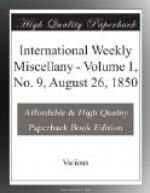“The American publisher steals the works of British authors, because he is immoral enough to do it, because he is scoundrel enough, and the nation is scoundrel enough to permit it. (Ironical cheers.) Yes, because the nation is scoundrel enough to permit it.”
Our unknown friend who sends us this wants us to give Hincks a thorough roasting for it, and evidently expects every hair on our head to bristle with indignation. Now we have not the least objection to roasting the Minister aforesaid, and will do it when a fair chance presents itself, but we don’t consider this such a chance. In fact, though we think Francis has drawn rather a strong draught from “the well of English undefiled,” yet essentially we regard his observations above quoted as rather more than half right. It is rascally to steal a man’s book, print it, sell it, read it, and refuse him any pay for the labor of writing it; and we don’t see that his being an Englishman makes any material difference. There may be a cheaper way to get the proceeds of another man’s toil than by paying for it, but we don’t think there is any other strictly honest way.—Tribune.
* * * * *
HERR SCHUMANN’s opera, “Genevieve,” was produced at Leipsic on the 28th ultimo. “This work,” says the Gazette Musicale, “after having been much recommended beforehand, does not seem to have satisfied public expectation, being concert music, without any dramatic force.” For the verdict which will finally be passed on “Genevieve” every one must be curious who has at all followed the journals of Young Germany in the recent crusades which they nave made, not so much to establish Schumann as a great composer, as to prove him greater than Mendelssohn.
* * * * *
THE GRAND LITERARY TRADE SALES are now in progress in New York: and the catalogues of the rival houses are the largest ever printed. Cooley & Keese at their splendid hall in Broadway present this year a richer and more extensive series of invoices than has ever before been sold in America.
* * * * *
THE FINE ARTS.
* * * * *
Bavaria is a sort of artists’ paradise, both the late King Louis and the present Maximilian being determined to leave behind them the glory of munificent patrons of art. In this they have so far succeeded, that Munich, which before their time was by no means among German cities the most worthy a traveler’s attention, may now dispute the palm even with Dresden, notwithstanding the unrivaled gallery of paintings, possessed by the latter. For students of modern art, and especially of the German schools, Munich is incomparable, while its collection of ancient sculptures cannot be equaled out of Italy. We now learn that King Maximilian has conceived the plan of a grand series of pictures to comprehend the prominent epochs and events of history. The most eminent German and foreign artists are to be invited to assist in carrying out this immense undertaking; so that thus the series will not only represent the great experiences of mankind, but will, it is hoped, contain specimens of all the great schools of modern painting.




